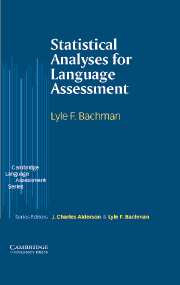Book contents
- Frontmatter
- Contents
- Series Editor's Preface
- Acknowledgements
- Abbreviations
- Part I Basic concepts and statistics
- Part II Statistics for test analysis and improvement
- 4 Analyzing test tasks
- 5 Investigating reliability for norm-referenced tests
- 6 Investigating reliability for criterion-referenced tests
- Part III Statistics for test use
- Bibliography
- Appendix: Statistical tables
- Index
4 - Analyzing test tasks
Published online by Cambridge University Press: 05 May 2010
- Frontmatter
- Contents
- Series Editor's Preface
- Acknowledgements
- Abbreviations
- Part I Basic concepts and statistics
- Part II Statistics for test analysis and improvement
- 4 Analyzing test tasks
- 5 Investigating reliability for norm-referenced tests
- 6 Investigating reliability for criterion-referenced tests
- Part III Statistics for test use
- Bibliography
- Appendix: Statistical tables
- Index
Summary
Introduction
Suppose you've given a test to a large number of students, to place them into appropriate courses in a language program. You've calculated the descriptive statistics for the total scores, and discover that these were not at all what you'd expected. Perhaps the mean was very high, which would place too many students in the upper level courses of the program. Or perhaps the scores were too bunched together, so that too many students would be placed in one course. Or in another situation, consider a classroom teacher who has given an end-of-course achievement test to his class, calculated the descriptive statistics for the scores, and discovers that the scores are not at all what he'd expected. Perhaps the mean was very low, even though he thought his students had mastered the material. Or perhaps the scores varied greatly from very low to very high. In either of these cases, we might well ask whether there is something wrong with the test. In the first case, the test scores are not useful for the purpose of placing students into a wide range of course levels, while in the second case, the test scores don't correspond to the teacher's knowledge of his students.
In either case, the reality is that after a test has been given and scored, it's generally too late to change the results. Thus, in the case of the placement test, because test results did not spread the test takers out as much as needed, the program administrator may be faced with making some arbitrary decisions to adjust placements to compensate for the high scores and narrow distribution.
- Type
- Chapter
- Information
- Statistical Analyses for Language Assessment Book , pp. 119 - 152Publisher: Cambridge University PressPrint publication year: 2004
- 1
- Cited by

